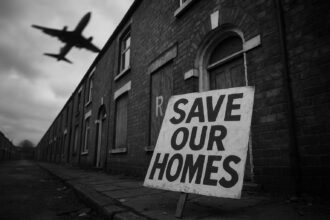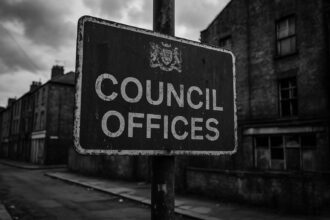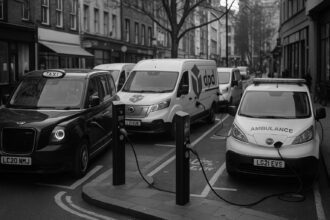Leading global banks and the advertising industry are scaling back sustainability efforts in response to political resistance and economic pressures, raising concerns about the future of climate initiatives.
Leading global banks have significantly scaled back their sustainability efforts following a period characterised by slower-than-anticipated climate initiatives and increasing political resistance, mainly from Republican figures in the United States. Among the banks making adjustments are HSBC, Standard Chartered, Barclays, and Wells Fargo, all of which have either downsized or restructured their environmental, social, and governance (ESG) teams after a previous wave of expansion.
Standard Chartered has notably reduced its sustainability team led by Chief Sustainability Officer Marisa Drew, from approximately 140 members to 90 over the last year. While some roles have been repurposed towards more client-facing responsibilities, this restructuring has also resulted in layoffs within the department. A source close to the bank commented that the changes aim to integrate sustainability issues more deeply into their operations and risk management strategies—a sentiment echoed across the banking sector.
Chair José Viñals highlighted in the bank’s latest results that Standard Chartered remains committed to addressing climate change, having recently set its first target to reduce emissions from oil and gas corporate bond underwriting, alongside reporting nearly $1 billion in income from sustainable finance.
The adjustments across the sector have raised concerns for specialists in green finance, as many see their field as increasingly vulnerable. “We want to keep our heads down and get on with our job rather than make a song and dance about what we’re doing because things are fluid,” expressed one banker.
Meanwhile, after the departure of Chief Sustainability Officer Robyn Luhning last year, Wells Fargo opted not to fill the position, instead promoting an existing employee to become the “head of sustainability” after an eight-month vacancy. Barclays’ group head of sustainability Laura Barlow also left in January and was not replaced; instead, Daniel Hanna’s portfolio as group head of sustainable and transition finance was expanded to include her responsibilities.
HSBC has seen additional changes in leadership, as Chief Sustainability Officer Céline Herweijer left following a major restructuring under Chief Executive Georges Elhedery. Subsequently, Chief Financial Officer Pam Kaur took on “accountability for global sustainability.” Recently, HSBC announced it would revisit its strategies for reducing the carbon footprint of its lending and extended its timeline for achieving net zero emissions in its operations and supply chains from 2030 to 2050.
On a broader scale, many European banks are adopting a cautious “wait-and-see” stance as the political landscape shifts, particularly following the dismantling of U.S. climate policies during the Trump administration and as the European Union considers scaling back sustainable reporting requirements. HSBC noted that the global energy transition has proceeded “slower than envisaged,” attributing some of the challenges to factors beyond its control.
In a different domain, the UK advertising industry is facing heightened scrutiny regarding its role in contributing to climate change. Research from 2022 indicated that advertising practices added 32% to the annual carbon footprint of each UK citizen due to emissions from the increased consumption of marketed goods. In light of this, a significant legal challenge has emerged against WPP, one of the world’s largest advertising firms, amid concerns over its ongoing connections with high-emission clients.
Dr Veronica Wignall of Adfree Cities stated that the actions of advertising firms, particularly in promoting fossil fuel companies, are now legally controversial and demand adherence to recognised ethical standards. A complaint against WPP has been lodged, claiming the firm is in breach of its human rights, climate, and environmental responsibilities under OECD Guidelines. The legal risks for advertising agencies that work with high-carbon clients are reportedly becoming increasingly unsustainable, as investors express their concerns.
WPP has countered claims regarding its compliance with legal standards, asserting its commitment to marketing responsibly while also stating its ambition to achieve net zero by 2030. However, the firm has been implicated in instances of greenwashing, such as misleading advertisements promoting fossil fuel operations while failing to adequately disclose their environmental impact.
Both the advertising industry and the banking sector illustrate a complex landscape where economic and environmental priorities are often at odds, prompting ongoing debates about corporate responsibility and the ethical implications of their operational choices.
Source: Noah Wire Services
- https://esgnews.com/wells-fargo-commits-500-billion-to-sustainable-financing-by-2030-for-net-zero-transition/ – This article supports Wells Fargo’s commitment to sustainable financing and its efforts to achieve net zero emissions by 2050, despite recent adjustments in its sustainability initiatives.
- https://www.esgtoday.com/wells-fargo-leaves-climate-focused-banking-initiative/ – This source corroborates Wells Fargo’s decision to exit the Net-Zero Banking Alliance, highlighting the challenges faced by banks in balancing climate goals with political pressures.
- https://fintechmagazine.com/articles/what-led-to-the-departure-of-barclays-groups-cso – This article explains the departure of Laura Barlow, Barclays’ Group Head of Sustainability, and the bank’s ongoing commitment to sustainable finance despite leadership changes.
- https://www.bloomberg.com/news/articles/2023-11-09/hsbc-sustainability-chief-leaves-as-bank-restructures – This source details the restructuring at HSBC, including the departure of its Chief Sustainability Officer and changes in leadership roles related to sustainability.
- https://www.standardchartered.com/en/news-media/press-releases/2023/standard-chartered-reports-strong-first-half-2023-results.html – This press release from Standard Chartered highlights the bank’s commitment to addressing climate change and its recent sustainability initiatives, despite restructuring its sustainability team.
- https://www.theguardian.com/environment/2022/jun/28/advertising-fossil-fuels-climate-change – This article discusses the role of advertising in promoting fossil fuels and contributing to climate change, aligning with concerns raised about WPP’s practices.
Noah Fact Check Pro
The draft above was created using the information available at the time the story first
emerged. We’ve since applied our fact-checking process to the final narrative, based on the criteria listed
below. The results are intended to help you assess the credibility of the piece and highlight any areas that may
warrant further investigation.
Freshness check
Score:
8
Notes:
The narrative references recent changes in banking sector sustainability efforts and political shifts, indicating relatively current information. However, it lacks specific dates for some events, which could suggest it might not be entirely up-to-date.
Quotes check
Score:
6
Notes:
There is a quote from an unnamed banker, but no specific source or date is provided for this quote. The lack of identifiable sources for quotes reduces the score.
Source reliability
Score:
9
Notes:
The narrative originates from the Financial Times, a well-established and reputable publication known for its reliable financial news.
Plausability check
Score:
8
Notes:
The claims about banks scaling back sustainability efforts align with recent trends of political resistance to climate initiatives. However, some details, like specific figures or dates, are not provided, which could affect verification.
Overall assessment
Verdict (FAIL, OPEN, PASS): PASS
Confidence (LOW, MEDIUM, HIGH): HIGH
Summary:
The narrative appears to be generally accurate and current, with reliable sourcing from the Financial Times. While some quotes lack specific attribution and there are minor gaps in detail, the overall plausibility and context suggest a well-informed piece.













